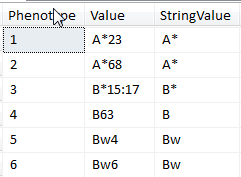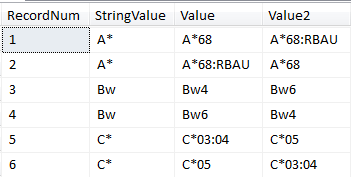briangriffin
Programmer
I have working code that splits values into a variable table:

I need to take the first two values, determine if the StringValues match, and if so pass both strings from the Value field as input parameters to another SP. If the StringValues don't match then ignore.
Then take values 2 and 3 and do the same thing, then values 3 and 4, etc. I can write loops and could probably cobble something together but I wanted to ask the group what the most efficient way of handling this would be. TIA.

I need to take the first two values, determine if the StringValues match, and if so pass both strings from the Value field as input parameters to another SP. If the StringValues don't match then ignore.
Then take values 2 and 3 and do the same thing, then values 3 and 4, etc. I can write loops and could probably cobble something together but I wanted to ask the group what the most efficient way of handling this would be. TIA.

